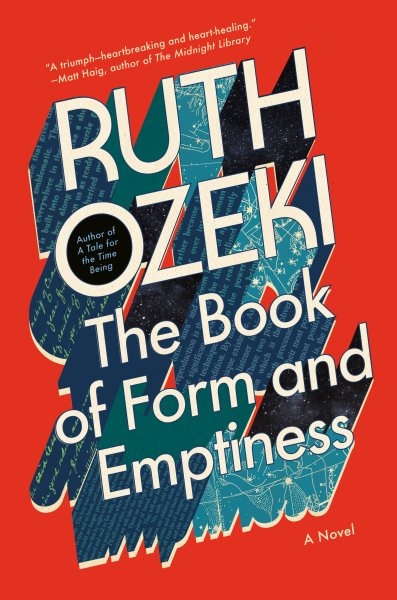
Ruth Ozeki's latest novel, The Book of Form and Emptiness (2021), is a big book in terms of length. It's a big book, too, in terms of the ideas and issues with which it deals, including Zen Buddhism, mental illness and the systems that surround its treatment, the nature of reality, and the pressures of the marketplace and capitalism. (Don't worry, Ozeki isn't didactic about any of this; these concerns are incorporated seamlessly into the plot.) Finally, Ozeki's novel is a big book when it comes to the the emotional impact it may have on you as a reader by the time you reach its surprising ending. This is one of those rare novels that inspires readers to think and feel deeply, that is both accessible and experimental. I found it a truly unique and rewarding reading experience, and I hope you might as well.
We meet Ozeki's two central characters; a woman named Annabelle, mother and media tracker, and a boy named Benny, son and soon-to-be teenager, in the midst of a family crisis. Kenji Oh, husband and father, has died in a tragic accident, one that suggests troubles already existed in this household prior to the novel's opening.
Life for Annabelle and Benny Oh is entirely upended with Kenji's loss, and trauma and grief take hold. Annabelle becomes isolated, with only terrible headlines and her possessions for company; she soon turns hoarder. Benny hears his father speaking to him, and soon objects, human-made and natural, are talking to him as well, screaming, crying, pestering, provoking. Needless to say, Benny becomes as isolated as his mother, until he makes his way to the public library, that is, and finds a unique set of friends. Yet their troubles are not neatly ended and tied up with a bow there. The novel carries on, and the challenges increase, as does the pacing and momentum.
If you are a member of a book club, The Book of Form and Emptiness, winner of the Women's Prize for Fiction in 2021, makes for a fantastic discussion. It makes for a meaty and accessible, if at times mysterious, read, if you're interested in digging into it on your own. However you read this novel, I would encourage you to immerse yourself in a few reviews of it and in interviews with the author—particularly if you are not already well-versed in Buddhist practices, parables, and philosophies. It made a huge difference in my understanding of Ruth Ozeki's beautiful and meaningful book to do so.